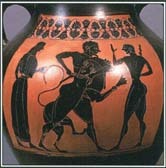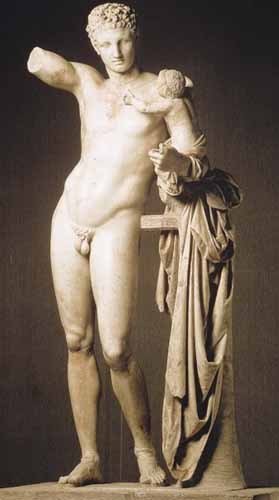With the recent news about the NASA Messenger probe orbiting the planet Mercury and today being the first day of a Mercury retrograde period, I’ve got Mercury on my mind and thought this might be a great time to post something about the ancient Roman god Mercury, or more specifically his Greek counterpart Hermes.
Hermes is the Greek god of crossroads, boundaries, communication, travel, commerce, shepherds and cowherds, orators, poets and writers, athletes, and thieves. Hermes is a messenger between the gods and men and also a psychopomp escorting the dead to the Underworld. Hermes is one of only a few gods who could cross to and from the Underworld without hindrance. He is also a trickster god.
Hermes is most often portrayed wearing a winged cap, winged sandals, and carrying either a caduceus (staff entertwined by two serpents) or a kerykeion (a staff topped with a symbol similar to the astrological symbol for Taurus). His other symbols include purses or bags, roosters, and tortoises.
Hermes protects and takes care of travelers, miscreants, harlets, crones, and thieves. As a runner himself, he is also always looking out for runners and athletes. People would offer him sacrifices before taking a trip to ensure a safe and easy journey.
Originally, Hermes was an older, bearded, phallic god of boundaries. Piles of stones called herms were placed at boundaries and as wayside markers. Later these were replaced with rectangular pillars with a Herme’s bearded head and an erect phallus. In Athens, these were even placed outside houses for good luck.
Hermes later became the youthful athlete that we are most familiar with. His realm included the gymnasia and Greek artists revised his statues to reflect a handsome, athletic youth and his statues along with those of Eros and Heracles were often found in the gymnasia.
Eros, Hermes, and Heracles made up a homoerotic trinity of gods presiding over homosexual relations. Eros bestowed the blessing of physical beauty onto male lovers. Heracles offered strength to male sexual partners. Hermes bestowed lovers with the gift of eloquence.
Like most Greek gods, Hermes had both female and male lovers. Hermes male lovers included Amphion, Antheus, Chryses, Crocus, Perseus, and Therses.
Later on in the third century CE Egypt, Hermes was invoked as “Hermes of the Underworld” in both homoerotic and lesbian love spells. This is evidenced in a collection of texts known as the Greek Magical Papyri used in a Hellenistic system of magic.
Like this:
Like Loading...














